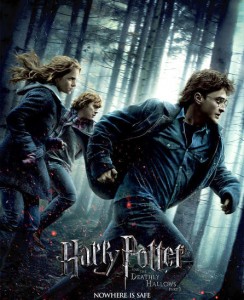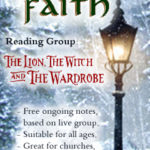How Do We Love A Fiction Legalist? Part 1
This column doesn’t seek to give all answers to the question, but to seek answers. The fact is, most Speculative Faith readers have already wrestled with many fiction-related issues: the magic, worldviews, portraying sin without tempting others (such as the Bible does), and so on.
 Yet how do such readers discuss these matters with our brothers and sisters in Christ who have very different views?
Yet how do such readers discuss these matters with our brothers and sisters in Christ who have very different views?
For example, tonight at midnight, thousands of viewers will flock to theaters to see the latest film installment about You-Know-Who, and I don’t mean a Dark Lord: Harry Potter and the Deathly Hallows, Part One. (I will not be among them, only because I need to work on Friday — my wife and I will likely see the film on Friday night.) Many have long since settled their beliefs about Harry Potter, with good and bad reasons offered on either side. But then there’s this:
On July 8 at midnight, bookstores everywhere were stormed by millions of children to obtain the latest and fourth book of the series known as “Harry Potter and the Goblet of Fire.” These books were taken into homes everywhere with a real evil spirit following each copy to curse those homes. July 8th was also the 18th day (three sixes in numerology) from the witches’’ sabat of midsummer. July 8th was also the 13th day from the signing of the United Religions Charter in San Francisco.1 is called ‘the nameless one,’” (just like Voldemort, she suggests), why should we believe the bad guys? Theirs is a made-up religion. And even if they do get this from the Devil, he is a deceiver. He makes things up — such as claiming that he owns the world. Similarly, how can anyone know for sure that “‘Azkaban,’ ‘Circe,’ [sic?] ‘Draco,’ ‘Erised,’ [?! That is ‘desire’ spelled backward!] ‘Hermes’ and ‘Slytherin’ … are names of real devils or demons”?]
This blogger, writing on July 18, 2005 under the name “Journey 2 Wholeness Ministries,” claims to have been a paganism practitioner and even a witch. But it seems clear from that paragraph alone — to say nothing of the rest — that she hasn’t yet gotten past old superstitions.
Not all Christians who reject or just don’t care for Harry Potter books take that level of careless reasoning, or even plain mysticism: bringing “numerology” into the issue, imagining all manner of evil date connections, or supposing some bizarre insider-demon-trading information about which demons are assigned to infest which objects (Biblical proof, please?).
But even if Christians do descend to that — how can we best love and reason with them?
Love in questions and discussion
God-honoring fiction can certainly illustrate better ways of engaging with the world and false beliefs, but the greater battle lies on the nonfiction front.
I mentioned that our blogger has carried things over from her former religion (which by the way I need not assume is a false claim, though some Christian leaders have lied about “Satanic” backgrounds). What she’s carried over is not demons, but un-Biblical beliefs.
And from what I’ve read from many Christian critics of fiction itself, such beliefs aren’t just used against any particular book. They may be behind critics’ statements such as “fiction is not useful” or “the Devil can too easily deceive us through fiction.”
Thus one might ask, likely after knowing this person and showing God’s grace in other ways:
- Who is in charge of the world: Jesus or the Devil? To Jesus the Devil lied on a mountaintop, trying to bribe Him to worship him, by claiming “[the world] has been delivered to me, and I give it to whom I will” (Luke 4: 5-7). But God’s Word specifically says “the earth is the Lord’s, and the fullness thereof” (Psalm 24:1, also cited in 1 Cor. 10:26), and that includes all the world’s kingdoms and governments (Romans 13). Whose claim should we believe?
- Is God sovereign? What has He said about His power to preserve His people for His Name’s sake and for their good, out of his love? Or is He helpless against some evils?
- Similarly, do people really sin without knowing it? Or is sin, whether from Christians or non-Christians, intentional — and not based on some external source, but our own sinful hearts? Jesus’ statements in Mark 7 about sin’s true source are crucial to understand and believe here.
- If it’s true that “high level witches believe that there are seven satanic princes” and that “in coven meetings, [the last prince] is called ‘the nameless one,’” (just like Voldemort, she says), why should we believe the bad guys? Theirs is a made-up religion. And even if they do get this from the Devil, he is a deceiver. He makes things up — such as claiming that he owns the world. Similarly, how can anyone say for sure that “‘Azkaban,’ ‘Circe,’ [sic?] ‘Draco,’ ‘Erised,’ [?! That is ‘desire’ spelled backward!] ‘Hermes’ and ‘Slytherin’ … are names of real devils or demons”?
- Even if that is how demons operate, is that really the context of Rowling’s presentation of the evil Lord Voldemort? Moreover, even if she were drawing (even knowingly!) from an actual fact about the demonic world, doesn’t it mean something that she applies this to the bad guy? Voldemort is also pictured with an evil serpent that obeys his will, similar to how the Devil acted through a serpent in the Garden of Eden (Genesis 3). But again, he is clearly the stories’ villain.
- “Warner Brothers (the producers of the Harry Potter movies) claimed the first movie was an accurate portrayal of witchcraft.” Witchcraft is certainly a sin, but so is being careless with facts and deceiving others. Where is this quote? Moreover, for someone claiming to be so well-versed in actual witchcraft practices, is it accurate, and honoring to the God of truth, to claim that the Harry Potter books, regardless of other flaws, are “training manuals for the occult”?
- The Apostle Paul warned against treating Things as sinful just because pagan practitioners use them to commit sin (Romans 14, 1 Cor. 8-10). Any caution about Christian discernment that doesn’t include this caution the other way has presented a truth imbalanced with other truths — which can quickly become a lie. Finally, Paul himself read pagan poetry about Zeus (Acts 17:28).
Next week: Biblical verse-hurling and arguments alone may not convince even a more-grace-minded fiction legalist. So in what other ways might we love them in Christ?
- If it’s true that “high level witches believe that there are seven satanic princes” and that “in coven meetings, [the last prince ↩











































A friend and I had this same discussion. I used to be one of those fiction legalists. I guess I jumped on the bandwagon making assumptions before I even read the book. I followed the same crowd who jumped on the bandwagon not liking Amy Grant because of speculation. It wasn’t until I heard her story that I learned a very important lesson.
Gossip is horrible. :o)
And it’s what it is basically…gossip against another book started by legalism or a company trying to discourage sales. I like what a friend of mine’s philosphy was: read the book yourself and then draw your conclusions.
Stephen, I’ve grappled with this myself. I’ve viewed this from the angle of one who firmly believes witchcraft to be evil and something to be avoided, but I can also recognize that what’s found in the book is a made up flights of fancy, not really using the real stuff and instead turning something bad into whimsical storytelling. Part of this though, my friend, is that witchcraft has a big stigma surrounding it and even otherwise innocent children’s stories written on the subject are going to be affected by this as well. Before HP the only “good” witch that I’d ever heard of was Glenda from the Wizard of Oz….every other one was evil…this is even how Lewis depicted witches in the Chronicles. Perhaps that’s playing into it too…
I’ve wrestled with the HP books for some time. The paradox is that I’m not so suspicious about wizards in stories (and they tend to be even *larger* practitioners of “magic”…even CS Lewis had a few in his stories) and have even played a few games of D&D in my time (shhhh…don’t tell my mom 😉 ) but then again I recognize these (as do lots of other folks) as mythological story creations. There’s no such thing as wizards or Orcs, but there are such things as witches. Witchcraft is very real and its practice is an act of evil, even if many of its practitioners are unwittingly ignorant of this. Would we be quick to defend a bunch of stories about Satan-worshipping crime detectives who eat pizza on the weekends and attend playful make-believe animal sacrifices? What’s the distinction here? I don’t think readers of HP are going to automatically run off and join their local Wiccan coven, but it may make some interested in the subject, and that’s something that can’t be discounted either.
Do I make any sense here?
The difference here is that the Harry Potter series contain very little real witchcraft (real witches have complained about being mis-represented by the books). The small excerpts of real witchcraf are only ever practiced by evil characters and leads to corruption of the body, mind and spirit. Also, the dark arts are referred to as forbidden magic. Theere’s even a class at their school called ‘Defence Against the Dark Arts’. Spiritual warfare? I’d be more worried about the ‘good’ witches and wizards in some fairytales. Here, the dark arts are never glorified. The magic in HP is much more akin to Enid Blyton’s ‘Far Away Tree’ series (only more mature) than the tv series ‘Charmed’ or a coven of witches. The magic is a plot-device. The essence of the HP stories is that they coming-of-age stories based in an English-style boarding house, it just so happens that the house is a place for people to learn to be responsible with the magic they inherently possess. The greatest evil for readers is Rowling’s overuse of adverbs and adjectives. Other than that, the series is very good and provides great moral and spiritual truths, not unlike Narnia, Lord of the Rings etc. That’s not not to say readers shouldn’t be discerning, we should, but we also need to recognise God’s sovereignity and power in this world (and the world of fiction).
Thanks for this sad reminder.
[…] This post was mentioned on Twitter by David Muir, Erika Penn. Erika Penn said: Speculative Faith: How do we love a fiction legalist? — part one: “Warner Brothers (the producers of the Harry P… http://bit.ly/98Lc3t […]
I’m looking forward to what the rest of this series has to say. I have vehemently condemned the HP books and movies in the past (I used to be quite the legalist about them!), but since then I have realized that they are probably more harmless than not, and making a big fuss over them is silly.
I still would not consider them very wholesome reading, however, and would be reluctant to allow my own future children to read them unless we could discuss them in detail – not because they contain witchcraft (so does the Bible, as Andrew Lansdown points out!), but because they take elements normally portrayed as evil, and depict them in a good light. (Isaiah 5:20, 3 John 1:11a.) Riding broomsticks, for example, is traditionally associated with witches (not that real witches do that…it is associated with evil, however). I agree with Ethan, above – I do not believe there is any thing such as a “good witch”. As Christian points out, the books do not contain much “real” witchcraft, but personally I don’t think make-believe witchcraft is good to absorb oneself in, either.
The disclaimer here is that I have never read the books. However, I am growing curious and I am interested in reading them from an analytical standpoint to see what the big fuss is all about. They are a major fantasy book, and as an aspiring author I think it’s good to be familiar with what’s out there. 🙂 I want to form a more educated opinion, whether that means my views will change or merely get reinforced.
As I said, I don’t believe that they are inherently evil, but I do think one should approach them with discernment, especially in regards to young readers.
The broomsticks association is a bit thin. They were used to clean floors, they were then adopted to tell stories about witches. In HP, they’re nothing more than a form of transport. I too believe we should treat the series with discernment, but realistically we should be treating anything made by flawed sinful people, with discernment. My thinking is that Rowling has done something akin to C.S. Lewis in sharing some of the Christian message by cloaking it within her story (although not as overtly as he). Isn’t it possible God used her to smuggle his truth into the homes of those who would never listen to it in another form? It’s possible.
I agree, the broomsticks association is a bit thin, but it is still associated with witches. As I said, I don’t think it is the ultimate evil book or anything, but I do think it does some turning around of good and evil. Having not read the books, however (or even seen the movies), I cannot form a detailed opinion on the subject, so for the present time I think I will bow out of the discussion if I may. =)
Hey Bethany, I’ve never read all the way through The Shack and I still take part in discussions about it — and even critique people who claim it’s filled with such truth. Where this is different, though, is that many Christians — as I think you’ve already hinted at — have some wrong ideas about what exactly is in the Potter books. Whereas so far, I’ve had no one say that my understanding about what’s in The Shack is wrong.
All that to say, I hope you’ll still stick around and not be intimidated if anyone says (or hints at) “well, you haven’t read the books so you can’t comment.”
About broomsticks and the concept of association, one simple question to ask: if a bona fide “witch” claims the idea of riding a flying broom is inherently evil, and Scripture says nothing one way or the other, why would Christians believe the “witch”? Wouldn’t this actually be compromising with a pagan belief?
That is true about The Shack. I haven’t read that, either, yet I have read some wise reviews on it, so I understand the basic problems with the story. I perhaps know a little bit less about Harry Potter, since it’s been awhile since I’ve read any detailed reviews and I’m mostly going off rumors and things I’ve heard from friends or online. I’ll definitely stick around! I just don’t think I’ll get into any detailed discussions unless I am sure about my information. =)
That is a good point about the broomstick association. I can’t say whether it changes my opinion or not (again, having no firsthand knowledge of HP), but it is good food for thought.
Thank you for welcoming me and encouraging me to stay! I am new around here so I’m kind of shy. =)
This is kind of an aside, but I’m curious…why did you choose the term “fiction legalist”?
Why “fiction legalist”? This miniseries (which may be two or three parts) isn’t just about Christians who disagree with a certain series, but those who don’t think fiction can be Godly at all, or that it must have such limits on it that stories can fail to reach their God-glorifying potential.
Or a related and perhaps subtler form: some Christians think that a story must be Allegorical or else it’s not beneficial — and thus might miss out on the new ways to present truth from, say, The Chronicles of Narnia, which are not allegorical but are instead fantasy based on supposal. Meanwhile, some Christians who enjoy Harry Potter have explanations about how the whole thing is a Christian Allegory, which I think — apart from redemption themes that are common to many stories — as not only a tough case to make, but an unnecessary one. I can enjoy the Potter stories, or other stories, even if they are not Allegories. And so long as I am not personally tempted to sin, the only sin might be wasting my time.
Oooh, I am really looking forward to the rest of this series!
I ask because the term “legalist” refers to someone who relies on their own efforts and good works to either “get” salvation or maintain it…it refers to someone who (maybe even unconsciously) doesn’t believe Christ’s work is sufficient for their salvation. So, I don’t know that it is correct to call someone a legalist purely on the basis that they disapprove of fantasy, non-allegorical fantasy, or fiction in general. They could certainly have legalist attitudes about the matter, though.
Under those two definitions of “legalist,” you’re right, I doubt simply thinking certain genres or books are wrong would fall under that attitude. However, there’s a derivative from sanctification legalism — the kind of legalism that, though saved, forgets about the Gospel in sanctification — that still tries, often accidentally, to add to growth in holiness, and misidentify the sources of evil.
For example, just now I was listening to a John MacArthur clip on the radio about discernment (in fact, he’s still talking as I type this). He brought up one of the key verses about discernment, 1 Thessalonians 5:22: “Abstain from every form of evil.” So far he’s preached accurately from that.
But some Christians have an idea based on the somewhat confusing (to our ears) KJV wording: “Abstain from all appearance of evil.” This means, say some Christians, that we not only avoid evil, but everything that could appear to be evil. However, that’s not even what the KJV meant there: it doesn’t mean anything that might be evil or appears to be evil (to whom?), but actual forms of evil. And even Christians who haven’t specifically thought wrong about that verse may have the wrong idea back in their minds — I know I did, for a long time, before hearing of this misconception of the verse!
This isn’t to say that something that looks evil is always good. But it is to say that some Christians “discern” in ways that aren’t Biblical — whether they’re accepting everything because “it’s just entertainment” or throwing it all out because of a quasi-Biblical idea that all entertainment, or a certain series, must be bad because it appears to be bad, or because some use it for bad.
But even Scripture itself can be abused and used for bad. Some people use church procedures for evil purposes. Does that make Scripture or church traditions themselves bad? Not at all. It was the evil intent in the person’s heart, not the Thing. Similarly, with things like Harry Potter or many other stories (aside from those that inevitably exacerbate sin by showing naked people or hideous, redemptionless violence), many Christians can take the good and leave the bad — except for those, of course, who have a sincere stumbling-block issue, or who would be wasting their time because they have different callings in life.
J.K. Rowling is not a Christian. Or if she is she hides it well. But I read other stuff by non-Christians, so that in itself is not an argument against her series.
Christian – You know, I haven’t read the books. I allowed a friend to talk me into the second movie (nothing else was worth our time), and I’ve watched it and the succeeding movies (still haven’t seen the first). I wasn’t totally sold on the second, but one thing that really intrigued me about it were the very things you mentioned. The graveyard scene in Goblet of Fire contains a portrait of evil that is by far one of the most amazing I’ve ever seen. Unnerved me, a little. There are rules you don’t break in the series, and generally my biggest complaint early on was how young Harry is (adults relying on an eleven year old = unnatural). My other, well, Half-Blood Prince was a bit of a let-down, but I already made the Hogwarts High School Musical comment.
At any rate, my two cents. Really, if Hogwarts had any other setting, no one would care.
[…] Two weeks ago, reader Bethany asked, quite fairly, how come I used the word “legalist” to describe Christians who oppose either a certain fantasy series, like Harry Potter, or all fiction. […]
[…] Part 1: Ask pointed yet gracious questions about what Biblical reasoning exists to reject even “secular” fantasy such as Harry Potter, such as: are we sure we’re not avoiding “magic” with beliefs that themselves are based on mysticism and not Scripture? […]
I read the first two books and these allowed the devil a foothold in my life. But my conscience bothered me while I read them–yet I persisted. If your conscience doesn’t bug you it’s not a sin.
Perhaps it’s like eating meat sacrificed to idols. Consider me a weaker sister. (Unimpressed with the literary quality. Though it was better than the Left Behind Saga.)